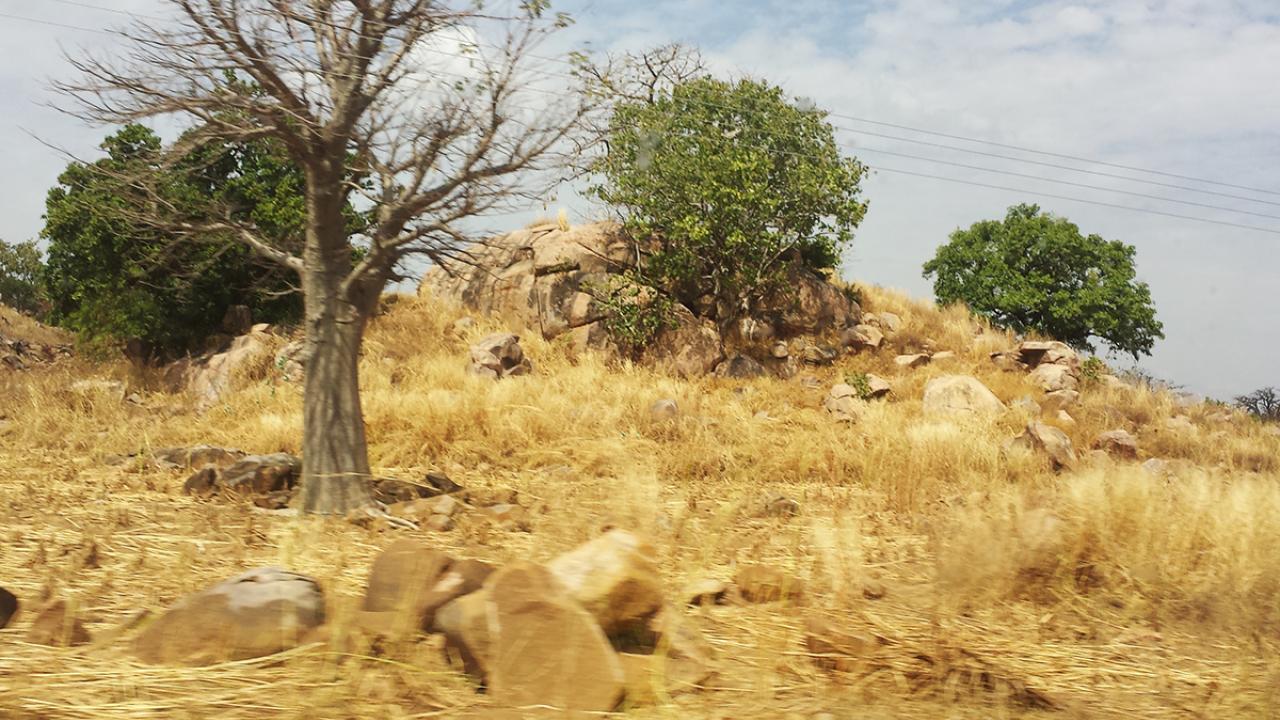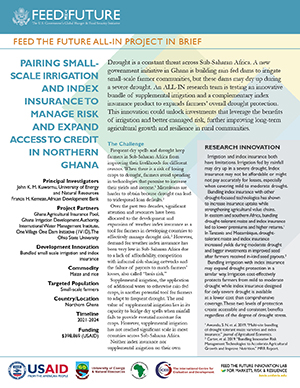
Drought is a constant threat across Sub-Saharan Africa. A new government initiative in Ghana is building rain-fed dams to irrigate small-scale farmer communities, but these dams may dry up during a severe drought. An ALL-IN research team is testing an innovative bundle of supplemental irrigation and a complementary index insurance product to expands farmers’ overall drought protection. This innovation could unlock investments that leverage the benefits of irrigation and better-managed risk, further improving long-term agricultural growth and resilience in rural communities.
Project Overview
Principal Investigators: John K. M. Kuwornu, University of Energy and Natural Resources; Francis H. Kemeze, African Development Bank
Project Partners: Ghana Agricultural Insurance Pool, Ghana Irrigation Development Authority, International Water Management Institute, One Village One Dam Initiative (1V1D), The Ohio State University
Development Innovation: Bundled small-scale irrigation and index insurance
Commodity: Maize and rice
Targeted Population: Small-scale farmers
Country/Location: Northern Ghana
Timeline: 2021-2024
Funding: $398,869 (USAID)
The Challenge
Frequent dry spells and drought keep farmers in Sub-Saharan Africa from improving their livelihoods for different reasons. When there is a risk of losing crops to drought, farmers avoid spending in technologies that promise to increase their yields and income.[1] Microloans are harder to obtain because drought can lead to widespread loan defaults.[2]
Over the past two decades, significant attention and resources have been allocated to the development and expansion of weather index insurance as a tool for farmers in developing countries to effectively manage drought risk.[3] However, demand for weather index insurance has been very low in Sub-Saharan Africa due to a lack of affordability, competition with informal risk-sharing networks and the failure of payouts to match farmers’ losses, also called “basis risk.”
Supplemental irrigation, the application of additional water to otherwise rain-fed crops, is another potential tool for farmers to adapt to frequent drought. The real value of supplemental irrigation lies in its capacity to bridge dry spells when rainfall fails to provide essential moisture for crops. However, supplemental irrigation has not reached significant scale in most countries across Sub-Saharan Africa.
Neither index insurance nor supplemental irrigation on their own can fully address farmers’ vulnerability to drought. However, bundling the two together may combine the strengths of both technologies at the lowest cost.

Research Design
This ALL-IN project, led by the University of Energy and Natural Resources in Ghana, leverages the Government of Ghana’s new flagship initiative “One Village, One Dam” (1V1D) to test an innovative bundling of index insurance and irrigation to increase productivity and resilience.
The project is being implemented as a randomized controlled trial (RCT) to measure the causal impacts of the index insurance and irrigation bundle. The team is measuring how the bundle affects demand for index insurance, the impacts of increasing the knowledge and adoption of supplemental irrigation, whether the bundle promotes the adoption of innovative agricultural technologies like improved seeds and fertilizer, and changes in agricultural productivity and livelihoods.
This project includes a sample of 1,800 rural families from 180 villages in Ghana’s Northern Savannah agro-ecological zone. Individual villages are randomly sorted into three groups:
- Treatment 1: Supplemental irrigation, no drought index insurance
- Treatment 2: Bundled supplemental irrigation with drought index insurance
- Control group: No supplemental irrigation or drought index insurance
The 1V1D initiative is providing access to supplemental irrigation for the staple crops maize and rice during rainy season and full irrigation for cash crops, livestock and households’ water needs during the dry season. The main source of water for these dams is rainfall. Farmers in treatment groups 1 and 2 are receiving training on drought management practices and the benefits of supplemental irrigation.
The research team is partnering with the Ghana Agricultural Insurance Pool (GAIP) to design an index insurance contract tailored to small-scale farmers with access to small-scale supplemental irrigation. The index insurance is based on satellite measures of rainfall that can predict crop yields. The index insurance will also include a fail-safe audit rule in which farmers or communities can request a secondary measurement of losses in case the insurance fails to pay accurately.
Women are included in the study in proportion to their high representation among small-scale farmers in Ghana, and the study measures impacts on women specifically. Men and women farmers are randomly assigned to each group in nearly equal proportions.
Development Impact
This project aligns with USAID objectives in Ghana in terms of its targeted crops of maize and rice and its focus on the country’s Northern Savannah agro-ecological zone. The project integrates nutrition and gender issues throughout and emphasizes improving the food security and resilience of vulnerable households. The project complements existing initiatives supported by Feed the Future and USAID that address agricultural productivity, food security, nutrition and access to credit and markets.
The project is also answering other questions that will guide its future scaling. In particular, the research team is developing the most cost-effective way to make the bundle of irrigation and insurance available and is assessing farmers’ willingness to pay for the product so as to ensure its commercial sustainability.
[1] Emerick, K., et al. 2016. “Technological innovations, downside risk, and the modernization of agriculture.” American Economic Review.
[2] Karlan, D., et al. 2014. “Agricultural decisions after relaxing credit and risk constraints.” Quarterly Journal of Economics.
[3] Carter, M., et al. 2014. “Index-based Weather Insurance for Developing Countries: A Review of Evidence and a Set of Propositions for Up Scaling.” UC Davis Working Paper.
This report is made possible by the generous support of the American people through the United States Agency for International Development (USAID) cooperative agreement 7200AA19LE00004. The contents are the responsibility of the Feed the Future Innovation Lab for Markets, Risk and Resilience and do not necessarily reflect the views of USAID or the United States Government.
